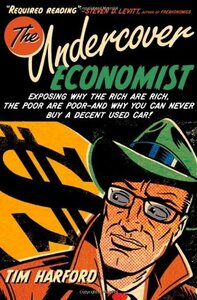Take a photo of a barcode or cover
This is a nice light read for anyone interested in economics explained in Layman’s terms.
Tim Harford explains fundamental facts about free markets and decision-making.
These ideas are easy to grasp as he illustrates with an impressive number of examples, some of which include buying second-hand cars, game theory in auction settings, why healthcare works in very different ways among countries, the impact of corruption on growth etc.
This book will not make you into an economics expert, but, as it promises to, it will leave you thinking like an economist.
Let’s just say I walk into a supermarket with a very different view now
Tim Harford explains fundamental facts about free markets and decision-making.
These ideas are easy to grasp as he illustrates with an impressive number of examples, some of which include buying second-hand cars, game theory in auction settings, why healthcare works in very different ways among countries, the impact of corruption on growth etc.
This book will not make you into an economics expert, but, as it promises to, it will leave you thinking like an economist.
Let’s just say I walk into a supermarket with a very different view now
After Chapter 2 or 3, I wasn't certain that I'd enjoy this book - especially after Harford gives us his less-than-great opinion on the design industry. However, I learned a lot in the book and thoroughly enjoyed most of it. The subsections of each chapter really help break up the text and his writing is friendly enough to be approachable - although I did have to re-read some paragraphs a few times.
I am undecided about the stars. (Edit: Let us go with 4.) Review on Tabula Rasa
informative
lighthearted
medium-paced
informative
slow-paced
A different tone than Gladwell et al that are writing pop economics, Harford focuses on key concepts, figures, and less eccentric applications of theories. Standouts are the chapters on the price of coffee and the rise of the Chinese economy.
funny
hopeful
informative
lighthearted
medium-paced
Tim Harford's an effective evangelist for economics and economists. Clear, well written and interesting - but I can't help worrying about selection bias and over-simplification in some of his examples. Harford's main message seems to be that economists are good; there's not an awful lot of nuance to that as he develops his ideas.
I’ve read 0 books on economics before this one so I have nothing to compare it to. I’d say Harford has scarcity power...
I learned a lot and 75% of the book was easily accessible and understood, I just didn’t enjoy reading most of it.
The best thing about the book was it’s ability to create nuance in America’s political conversation. When one party is talking about economics or the market, they rarely speak with the nuance of an economist. I got a lot of that from Harford and I’m appreciative of it.
I think this book could use a third edition and a more solid framework outlined to the reader at the beginning and end.
I learned a lot and 75% of the book was easily accessible and understood, I just didn’t enjoy reading most of it.
The best thing about the book was it’s ability to create nuance in America’s political conversation. When one party is talking about economics or the market, they rarely speak with the nuance of an economist. I got a lot of that from Harford and I’m appreciative of it.
I think this book could use a third edition and a more solid framework outlined to the reader at the beginning and end.
Pick this book when you have a 3-4 hour air travel ahead.


